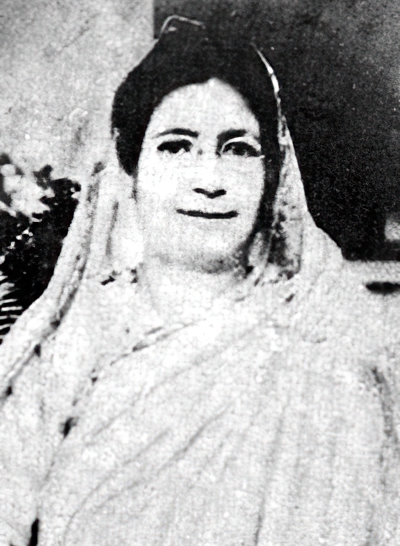Begum Rokeya
| Begum Rokeya | |
|---|---|

Begum Rokeya
|
|
| Born | Rokeya Khatun 9 December 1880 Rangpur, Bengal Presidency, British India |
| Died | 9 December 1932 (aged 52) Calcutta, Bengal Presidency, British India |
| Occupation | Social activist, writer, Muslim feminist |
| Language | Bengali |
| Ethnicity | Bengali |
| Citizenship | British Indian |
| Literary movement | Women's Rights |
| Notable works | Sultana's Dream, Padmarag, Abarodhbasini, Motichur |
| Spouse | Khan Bahadur Sakhawat Hussain |
Begum Rokeya Sakhawat Hossain, commonly known as Begum Rokeya (9 December 1880 – 9 December 1932), was a Bengali writer, educationist, social activist, and advocate of women's rights. Considered the pioneer feminist of Bengal, she wrote novels, poems, short stories, science fiction, satires, treatises, and essays. In her writings, she advocated that both men and women should be treated equally as rational beings, and the lack of education is the main reason of women's lagging behind. Her major works include Abarodhbasini, a spirited attack on the extreme forms of purdah that endangered women's lives and thoughts; Sultana's Dream, a science fiction novella set in a place called Lady Land, a world ruled by women; Padmarag ("Essence of the Lotus", 1924), another feminist utopian novel; Motichur, collection of essays in two volumes.
Rokeya suggested that education of women is the foremost requisite of women's liberation; hence she established the first school aimed primarily at Bengali Muslim girls in Kolkata. Rokeya is said to have gone from house to house persuading the parents to send their girls to her school. Until her death, she ran the school despite facing hostile criticism and various social obstacles.
In 1916, she founded the Muslim Women’s Association, an organization that fought for women’s education and employment. In 1926, Rokeya presided over the Bengal Women’s Education Conference convened in Kolkata, the first significant attempt to bring women together in support of women’s education rights. She was engaged in debates and conferences regarding the advancement of women until her death on 9 December 1932, shortly after presiding over a session during the Indian Women’s Conference.
Bangladesh observes "Rokeya Day” on 9 December every year to commemorate her works and legacy. On that day, Bangladesh government also confers Begum Rokeya Padak on individual women for their exceptional achievement. In 2004, Rokeya was placed at number 6 in the BBC's poll of the Greatest Bengali of All Time.
Rokeya Khatun was born in 1880 in the village of Pairabondh, Mithapukur, Rangpur, present Bangladesh, in what was then the British Indian Empire. Her father, Jahiruddin Muhammad Abu Ali Haidar Saber, was a highly educated zamindar (landlord) who married four times; his marriage to Rahatunnessa resulted in the birth of Rokeya, who had two sisters and three brothers, one of whom died in childhood. Rokeya's eldest brother Ibrahim Saber, and her immediate elder sister Karimunnesa, both had great influence on her life. Karimunnesa wanted to study Bengali, the language of the majority in Bengal. The family disliked this because many upper class Muslims of the time preferred to use Arabic and Persian as the media of education, instead of their native language, Bengali. Ibrahim taught English and Bengali to Rokeya and Karimunnesa; both sisters became authors.
...
Wikipedia
